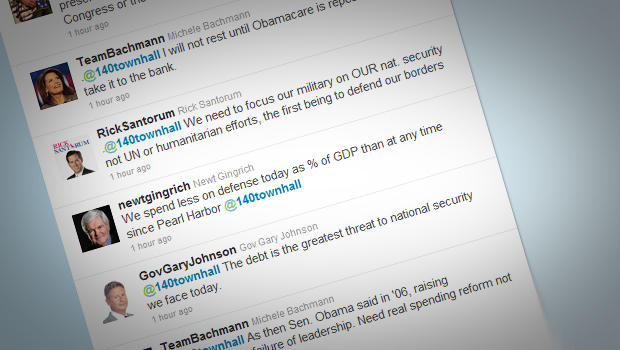GOP Twitter presidential debate shows limits of 140 characters
A group of Republican presidential candidates participated Wednesday afternoon in the first-ever presidential debate held entirely on Twitter. But the most compelling case they made may have been for the limitations of the format.
Michele Bachmann (@michelebachmann), Herman Cain (@thehermancain), Newt Gingrich (@newtgingrich), Thaddeus McCotter (@ThadMcCotter), Rick Santorum (@ricksantorum) and Gary Johnson (@govgaryjohnson) participated in the debate, which was sponsored by TheTeaParty.net. Four candidates - Mitt Romney, Tim Pawlenty, Jon Huntsman and Ron Paul - took a pass.
Twitter limits users to 140 characters, and a language has developed among users to get as much information as possible into that space. Hence Bachmann's first Tweet: ".@140townhall TY for this forum. I'm running 4 POTUS 2 bring the voice of the people back to DC. That voice requires fundamental changes." (The @140townhall was an identifier so that people following the debate on Twitter would see her comment; generally, Twitter users use what are called hashtags - the # symbol - for that purpose.)
The candidates were allowed to use two or three Tweets to make their points, giving them a little extra flexibility in responding to questions and making statements. (Bachmann followed up with ".@140townhall Fundamental change in how we spend #taxpayer $, & return to constitutional principles of ltd govt and personal responsibility.") Some, like Gingrich, Tweeted out links to videos on their websites to allow interested parties to get more information.
But for the most part, the character limit meant the candidates were reduced to offering little more than slightly modified talking points. They did not engage with one another, instead simply responding to questions from the moderator, conservative commentator S.E. Cupp, and the public with relative generalities that could easily have been found - in more detail - on their websites or in their public comments. And because the Tweets came fast and furious, it was often hard to follow what the candidates were saying when they tried to make a point in more than one Tweet.
Consider the second question posed by Cupp: "How do you weigh the cost of fighting the war on terror against the exploding debt crisis?" That question would seem to require a detailed response laying out the specific, hard choices that may need to be made when it comes to national security in light of the United States' current fiscal woes.
But specifics are hard to come by in 140 characters. Here's the response from Gingrich, the most followed Twitter user in the group: "Exploding debt crisis b/c of exploding politician spending in Washington, not b/c of national security." And from Bachmann : "Our security requires a strong defense and wise leadership. I will preserve our #military strength while using it judiciously."
If those answers told you anything you didn't already know about either politician, than you probably didn't tune into the debate in the first place.
It's understandable, and laudable, that the candidates want to reach out over new communications platforms. Candidates know new media platforms can be a powerful tool for reaching voters, as then-candidate Barack Obama illustrated in his 2008 campaign.
But Wednesday's Twitter debate showed they are still trying to figure out the best way to do so. When President Obama answered questions in a recent "Twitter town hall," he took the questions on Twitter but offered his answers over a live, streaming video - allowing him to offer complete thoughts instead of responding via Tweet.
The questions in Wednesday's debate also didn't always help, though it's hard to imagine what questions might have made the debate more illuminating. Cupp asked, for example, "What role do you think the Tea Party will play in the 2012 elections?" The candidates then competed for who could say the most flattering thing about the Tea Party movement. (The winner, perhaps, was Santorum, with these two tweets: "Hopefully as great as they did on the last election. Defending the constitution and limted govt. Thank you!!" and "The Tea Party is now the backbone of the conservative movement. It will help elect a principled conservative leader for 2012.")
After Cupp asked her questions, she briefly offered moderated questions from the public for the candidates. They then were asked to give their closing statements, which prompted Tweets like this from Cain: "The 2012 election will be a good year for the GOP, and I hope I can count on your support. We are America--God bless."
It should be noted that since the candidates were participating remotely, there was no way to know if it was the candidate him- or herself at the keyboard. Many lawmakers are known to leave their Tweeting to tech-savvy younger staffers, though some - notably Gingrich - take pride in authoring their own Tweets.
Those who watched the proceedings were able to do so via Twitter itself - the company was not involved in organizing the debate - or on the website http://140townhall.com/, which now hosts the full back-and-forth. Moderator Cupp said the event attracted on average 180 tweets per minute, and it got some good reviews on Twitter, including from one person who Tweeted, "this was a great idea. For the first time maybe were changing the way people get information."
But while Cupp described the event as "historic," it's hard to see how it will have much of an impact on the race for the GOP nomination. And there were those who were less than enthusiastic about the event, despite their embrace of Twitter.
"I'm all for innovation," a user named "texliberty" Tweeted during the event, "but this really is a terrible format for a debate."
